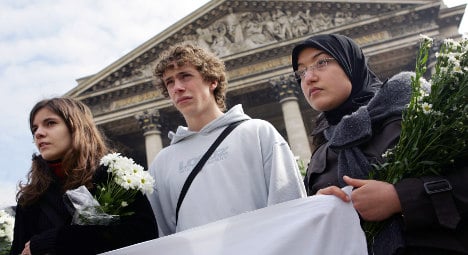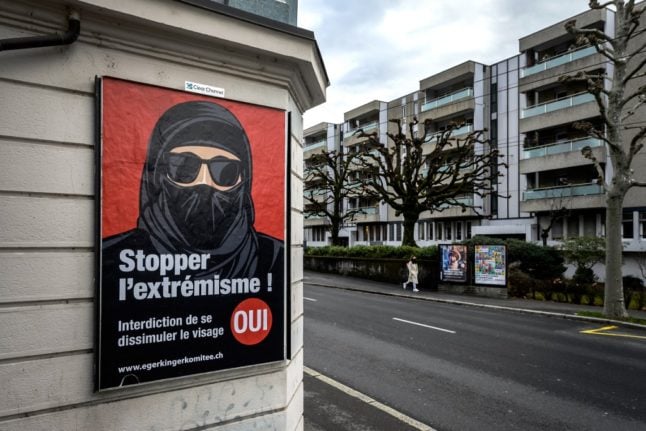The debate on Islam and secularism in France (known as laïcité) was reignited once again this week after it emerged that a new report had urged the government to ban the wearing of the Islamic veil in the country’s universities.
The authors of the report, the High Council for Integration argued it was necessary in order to defuse "growing tensions” at the country’s higher education institutions caused by religious differences.
However, the call to extend to universities the 2004 law that banned the wearing of religious symbols in state schools, has been met with shock as well as by those who say it's time it was updated.
Here two experts in law and Islam in France give their views to The Local on whether or not there is a need to extend the law and the problems with the current state of play.
Professor Raphael Liogier, Director of the Observatory of Religions:

“This would be a terrible idea and it is against the tradition of what French universities stand for. Students at universities have always been allowed to express their religious and political opinions. As a professor too, I am allowed to do the same. This is not the case for teachers in schools.
“The report talks about the need to protect public order in universities but if public order is threatened then we can simply call the police, we don’t need a new law to do that.
“The report also notes the problem of students challenging the content of the curriculum but I really doubt this is the case . In 10 years as a lecturer I have never seen that, and never heard that from any of my colleagues at the Sorbonne or other universities.
I had one incident when a student wearing the veil had a problem with a task I had set her, because of her religion. I told her she had to do it, that she could wear the veil but if she did not complete the task then she simply would not pass the course.
“We are in a period of time in France and in other countries like Britain too, when we are suffering from an identity crisis. People are concerned things are not like they used to be and they feel the need to defend themselves against this danger, which is considered to be Islam. This is why we have these reports. It’s really shocking.
“There is a certain notion of secularism particular to France. It’s been in law since 1905. In 2004 we had the law to ban the wearing of veils in schools with the justification being that we needed to protect children as they are not adults. I thought OK, fine even if it’s a bit strange.
“Then six years later we had a law which effectively banned wearing the full face veil in public with the justification being that people need to identify themselves in the street. Again I said fine.
“But at universities the students are adults and there is no question of having to identify them. Their justification changes all the time, but the real reason is that we feel we are in a time of crisis.
“The state pretends to be strong by creating new laws and in the end we end up discriminating against people who have nothing to do with the real problem. But when there’s a real problem the state does nothing.”
Raphael Liogier is the author of "The myth of Islamisation" and a professor at the Institute of Political Studies in Aix-en-Provence.
Dominique Baudis, President of the institution Défenseur des Droits (Defender of rights):

“We are asking the government to clarify the 2004 law over the banning of religious symbols, because it is not clear and it needs updating. We are asking for clarification between the principle of liberty, laid down in the constitution, and that of the principle of secularism, which is particular to France.
“Secularism is very special in France. In the UK, the US, Germany etc it is not the same. It’s a core part of our laws.
“The law was a good thing in 2004, but there are now grey areas that need to be cleared up. We are not in a position to say what that law needs to be, but only that it is blurred when it comes to areas like wearing the veil.
"Not just in universities, either, but in privately run businesses, at private nursery schools or even when it comes to whether Muslim woman can wear the veil when they appear in court as jurors.
“It leads to disputes such as the recent one in a private crèche [when a nursery worker was sacked for refusing to take off her veil], which went on for five years.
“This uncertainty is bad for relations not only between communities but between businesses and employees and it adds to the controversy and creates a climate of tension around religious signs.
“It introduces conflict at a time when we need to be defusing any controversy. The veil is a sensitive area but at the same time, the press over-hypes its significance.
“Since 2004 things have changed. Back then a lot of nursery provision was run by the state but now there are more and more private nurseries.
“At the moment the interpretation of the law on wearing the Muslim veil is being left in the hands of magistrates but they have different takes on the law so you can understand why citizens in France are also divided on it."
Many others have expressed views on the suggested veil ban at universities. For example, Jean-Loup Salzmann, head of France’s Conference of University Presidents (CPU) told L’Express:
“It’s a bad idea, in both form and substance. We do not need to address a non-issue by creating a law. A university is not a school. Students are adults and you cannot limit their freedoms. We think this is a subject that requires calm, discussion and certainly not an approach tinted with Islamophobia like that of the HCI.
“This report is disconnected from reality and it is unlikely the government will follow the recommendations.
“The subject [of banning the veil in Universities] had never been debated before the 2004 law. There has never been any question of implementing this law in universities. We have however published a guide for the benefit of students, a kind of code of good practice to observe secularism at universities: what is forbidden, what is allowed, and so on.”



 Please whitelist us to continue reading.
Please whitelist us to continue reading.
Member comments